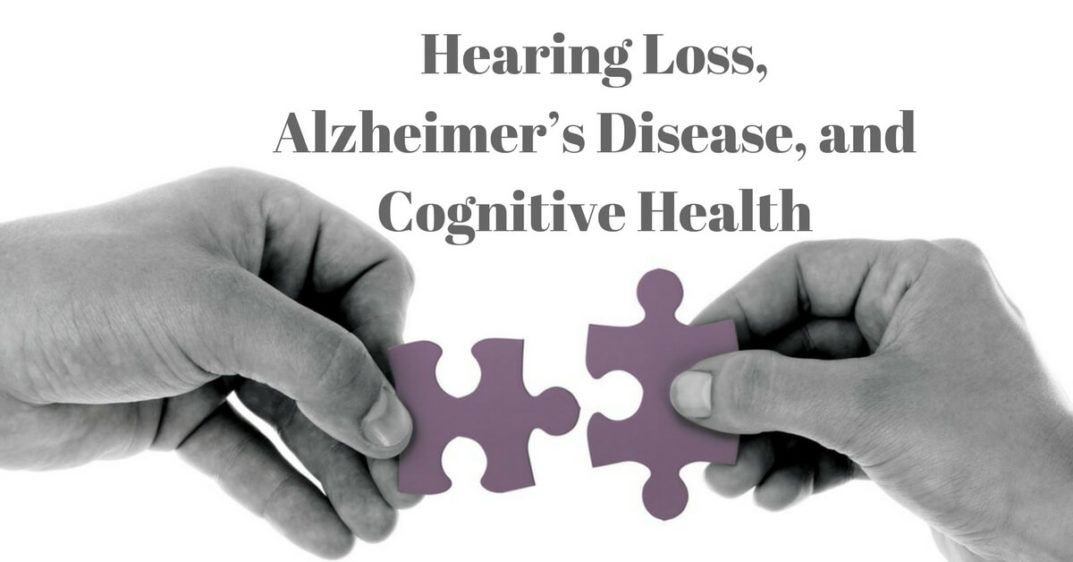Did you know that November is National Alzheimer’s Awareness Month? Alzheimer’s disease is a devastating form of dementia that gradually corrodes memory, cognition, and behavior patterns in those whom it affects. Although incurable, some medicines and treatments are currently in use to mitigate the onset and effects of Alzheimer’s disease, which is the most common form of dementia today.
Just in the past decade scientists have found a disturbing link between hearing loss and the risk of developing Alzheimer’s disease. Correlating expansive data from the Baltimore Longitudinal Study on Aging, a team at John Hopkins University in 2011 found that subjects with hearing loss had a strikingly greater chance of developing Alzheimer’s disease as they age. Since the release of the study, it has been postulated that the way hearing loss taxes our cognitive functioning may be partially responsible for the connection.
An Unusual Link
The research from John Hopkins, led by Dr. Frank Lin, was developed from a base of over 600 subjects who were evaluated for hearing and cognitive health over the span of over 20 years. Beginning with a population with a 25% incidence of hearing loss and no cases of dementia wellness statistics were tracked from 1990 until 2008. In 2008, incidence of dementia had greatly increased to 58 cases. When aligning statistics, it was found that subjects who had hearing loss became much more vulnerable to dementia.
The degree of vulnerability also corresponded to the severity of hearing loss. Mild hearing loss in a subject put them at twice the risk for dementia while severe hearing impairment multiplies their risk to 500% more than subjects with healthy hearing. Taking into account other well-established health factors that increase the risk of cognitive decline, such as diabetes and aging, the connection between damaged hearing and dementia remained evident.
Hearing Loss and Your Cognition
In the years since the work of the John Hopkins researchers was released, much work has been done to understand the impact that hearing loss makes on the development of Alzheimer’s Disease and other forms of dementia. Part of the answer may deal with the stress that limited hearing can put on our brain.
Our auditory system involves the finely tuned hearing mechanisms of the ear paired with a robust auditory nerve sending signals to the brain for interpretation. Our cognitive skills help translate sound into meaning in the auditory cortex of the brain. When hearing is damaged, our mind receives fractured information from the auditory nerve. The brain scrambles to use clues of sound and context to fill in the blank spaces in a sound transmission. The result is a faulty and stressful way of finding meaning in fragments of sound. Eventually, hearing loss greatly reshapes the pathways of the auditory nerve and the cognition methods of the auditory cortex.
Especially in the brain, extra energy is needed to compensate for hearing loss. Our mind requires that we use extra cognitive resources to make sense of difficult, incomplete transmissions of sound delivered by the inner ear. By routing additional resources to hearing, we shortchange other cognitive functions – such as balance and coordination. The redistribution of cognitive resources places stress on the entire system, stress that may eventually contribute to the development of dementia.
Ahead of the Curve
Hearing loss and dementia share another unfortunate similarity: there is no cure for these conditions. There are, however, treatments that can help curb the harmful effects of each.
In the case of dementia and Alzheimer’s disease, part of most new treatments being developed is understanding the long trajectory of a cognitive decline over the course of many years. Alzheimer’s has a course of around 14 years but often goes undetected for its first decade. If caught early, medication is currently available to delay the onset of severe Alzheimer’s symptoms. Catching the disease early is also fundamental to effective treatment, before permanent damage has been done to the brain.
Hearing loss also develops gradually, as permanent damage to our hearing accumulates into significant losses. Because of its incremental development, it takes people, on average, 7 years to acknowledge hearing problems and seek help. However, the earlier help for hearing trouble is sought, the more effectively it can be treated. Through the use of hearing aids, much hearing loss can be rehabilitated and the harmful effects of damaged hearing can be avoided or lessened.
Comprehensive Ear and Hearing
Your hearing health is connected in countless ways to your overall health so it’s important to recognize and treat hearing problems seriously. If something changes in your hearing, it’s important to seek help. Our team at Comprehensive Ear and Hearing can help diagnose any auditory problems and help connect you with solutions.


